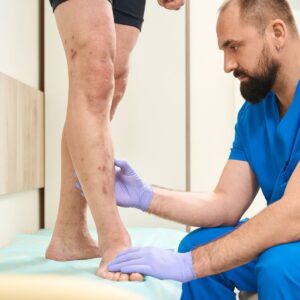
If you take pride in taking care of your skin, you might have come across different skin lesions.
A skin lesion is a broad term used to describe any abnormal growth, mark, or lump on the skin.
They are typically non-harmful but can sometimes cause cosmetic concerns or discomfort.
Continue reading to discover the common types, causes, and when you should consider the removal of skin lesions.

https://unsplash.com/photos/-6lGrOUTQBw
What Are Skin Lesions?
A skin lesion is an umbrella term used to describe any abnormality on the skin's surface. Skin lesions can include skin colour, texture, or appearance changes.
Skin lesions can present in a variety of ways and can be caused by a range of factors, such as genetics, sun exposure, or environmental toxins.
The most common types of skin lesions include:
- moles
- freckles
- skin tags
- warts
- age spots
Most skin lesions are harmless and do not require medical attention. In some cases, skin lesions indicate a more serious underlying condition.
They may be a sign of skin cancer, which can be a life-threatening condition if left untreated.
Why Do Skin Lesions Occur?
There are many reasons why skin lesions occur. Here are the most common ones:
Sun Exposure
Excessive sun exposure can harm the skin. The skin is the largest organ of the body; it protects the body from external factors such as sun exposure.
When the skin is exposed to the sun for an extended period, it can lead to various types of skin lesions. They include sunspots, age spots, and actinic keratosis.
Prolonged sun exposure can cause damage to the skin's DNA, which can lead to the development of skin lesions.
Protect your skin from the sun by using sunscreens, wearing protective clothing, and avoiding prolonged exposure to the sun.
Another way to protect your skin is by staying hydrated with salt and minerals. This helps to replenish the fluids and electrolytes that are lost through sweating and evaporation. Hydration also helps to keep the skin moist and elastic, preventing dryness and cracking.
Ageing
Our skin's ability to heal slows as we age, leading to skin lesions like skin tags and wrinkles.
This is because the proteins in our skin responsible for its elasticity, collagen and elastin, begin to break down over time, causing wrinkles and sagging.
Ageing skin is more susceptible to damage from sun exposure, leading to the development of age spots and other types of skin lesions.
Take steps to protect and nourish ageing skin, such as using moisturisers and sunscreen, as well as maintaining a healthy diet and lifestyle.
Acne
Acne is a very common skin condition that affects millions of people all over the world. It can cause a variety of skin lesions, including blackheads, whiteheads, and pimples.
These lesions can be unsightly and cause both physical discomfort and emotional distress.
Acne is caused when hair follicles become clogged with oil and dead skin cells. This can happen for a variety of reasons, including hormonal changes, stress, and certain medications.
Skin trauma
Skin trauma can come from a variety of sources, including cuts, burns, abrasions, and even surgeries.
When the skin is damaged, the body goes into repair mode, creating new tissue to heal the wound.
This new tissue can result in the formation of scars and other types of skin lesions. Scars can be raised, flat, or indented and come in various sizes and shapes. In this case, treatments can be performed by microneedling scars, laser therapy, cryotherapy and others.
Hormonal changes
Hormonal changes, such as those that occur during pregnancy or menopause, can cause skin changes that lead to skin lesions.
For example, during pregnancy, the body produces more hormones. Extra hormones lead to the development of melasma, a type of skin lesion that appears as brown or grey patches on the face.
Common Types of Skin Lesions
Most skin lesions are non-harmful and do not require medical attention. Yet, some may cause cosmetic concerns. Here are some common types of skin lesions:
Moles
Moles are a common type of skin lesion that can appear anywhere on the body. They are typically brown or black and can be flat or raised.
While most moles are harmless, some can turn cancerous over time. If you notice any changes in a mole's size, shape, or colour, you should consult a dermatologist.
Freckles
Freckles are small, flat spots that appear on the skin.
They are usually brown or tan and are more common in people with fair skin. Freckles are not harmful and do not need any medical attention.
Age Spots
Age spots, also known as liver spots, are flat brown spots that appear on the skin as a result of ageing and sun exposure. They are common among people over 50.
They are harmless and do not require treatment, but some people may choose to have them removed for cosmetic reasons.
When to Consult a Professional
If you notice any changes in your skin's appearance, seek professional advice. Specifically, if you have a skin lesion that changes in size, colour, or shape or causes discomfort in the form of itching or bleeding, you should consider seeing a dermatologist.
A dermatologist can examine your skin and determine if any lesions require treatment or removal. They might perform a biopsy to confirm the diagnosis if a skin lesion is suspected to be cancerous.
It's important to remember that regular check-ups with a dermatologist can help you treat potential skin problems early on before they become more serious. So don't hesitate to schedule an appointment if you have any concerns about unusual changes in your skin.
Conclusion
As we age, our skin is more prone to developing different types of lesions. While many skin lesions are benign and do not pose any health risks, some may need medical attention.
While it is true that prevention is key, it is not always possible to avoid the development of skin lesions.
However, protecting your skin from the sun's harmful UV rays is one of the best ways to reduce your risk.
Remember to always be vigilant when it comes to your skin's health and seek medical attention if you notice any concerning changes.


















Leave a Reply